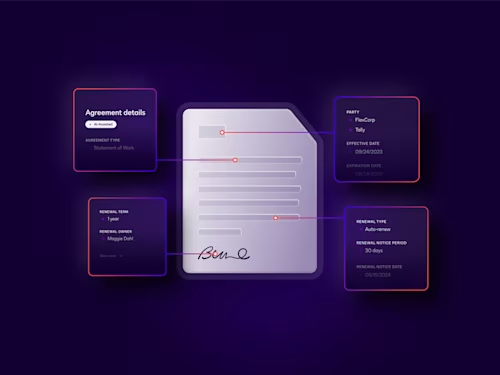
Digital Transformation Helps Commercial Real Estate Firms Offer Flexibility and Convenience
When contract management is seamless and simple, it’s a massive business driver for commercial real estate firms.
Table of contents

Over the past few years, the business landscape has changed significantly, especially in commercial real estate. From temporarily shuttered buildings to the explosion of digital technologies supporting remote interactions, change has been constant.
Change can be uncomfortable, but when it’s about providing truly flexible experiences for both businesses and customers, organizations should embrace it.
Trending toward transformation
The goal of any business is to maximize profits and delight customers with exceptional experiences that keep them coming back. When unexpected circumstances block that progression, organizations must adapt quickly.
Sudden office closures presented such a barrier—as well as an opportunity to transform how they do business. Successful companies realized quickly that they needed to shift to a hybrid and remote workforce to survive. Even now, as companies are reopening their physical offices, the trend toward a hybrid workforce and remote and self-service customer interactions is going strong. According to a new poll by Gallup, 53 percent of respondents indicated a clear preference for a hybrid work arrangement now and in the future. The same is true for consumer preference: brands scoring the highest in Forrester’s Customer Experience Index all digitally transformed their operations to better serve their customers.
For commercial real estate firms, this means providing the flexibility employees and customers desire, including implementing contract management technologies that enable remote interactions.
Current challenges
For most organizations, agreements between employees, customers, partners and vendors codify how business gets done. This is especially true for commercial real estate firms that manage myriad contracts and leases. When contract management is seamless and simple, it’s a massive business driver. But when it’s chaotic and confusing, it can quickly sap productivity and jeopardize deals.
This contract chaos is typically rooted in manual and paper-based processes, leading to a host of challenges for real estate investment firms, such as:
Unnecessary delays during tenant turnover that negatively impact consistent rental income
Postponements of critical and emergency maintenance projects that frustrate occupants and service providers
Version control issues and legal risks from buyers and sellers changing terms numerous times, right up to contract signing
Months-long negotiations and contract redlining delaying closing times due to complex sales processes with multiple stakeholders
Delays, legal risks and mounting frustrations can be disastrous. Digital transformation is key to streamlining the contract management process and providing employees, tenants, and business associates the simplicity and flexibility they want.
Time to transform
While full-scale digital transformation is the end goal, it can be overwhelming to consider and prioritize all the areas ripe for modernization. It truly does change how an organization does business, from improving how employees collaborate to how customers interact.
But with any large project, it’s a journey. Knowing where to begin is just as important as envisioning where to finish.
A great place to start is for an organization to evaluate how it creates, signs and manages all of its contracts and agreements. For commercial real estate firms, there’s a laundry list of documents to manage, such as leases, renewals, work orders, NDAs, purchase and sale agreements, addendums and many more. Trying to manage these manually, or even partially digitally, can be a recipe for chaos.
Centralized, cloud-based contract lifecycle management software is a must for organizations looking to streamline their processes, boost productivity and—perhaps most importantly—offer employees, clients/tenants and partners the convenience of remote and self-service interactions and transactions.
More specifically, end-to-end digital contract management offers the following benefits for commercial real estate firms.
1. Collaborate with virtually anyone, anywhere at any time
Digital contract management software delivers the flexibility and speed needed to complete agreements from virtually anywhere. In addition to supporting a more distributed and hybrid workforce, it’s critical for business continuity during unexpected disruptions.
But even with digital tools, agreement workflows can still be unnecessarily complex. A mostly digital workflow that still includes steps requiring manual interventions and in-person interactions will undermine the purpose of implementing these tools in the first place. When agreements are managed online from end to end, businesses and customers can work together, even when they’re not in the same room, country or time zone.
2. Minimize legal risk and extract new intelligence
Commercial sales contracts and leases are lengthy documents with extensive back-and-forth redlining, possibly exposing companies to legal risk if a word or clause is missed in all the different versions. Contract lifecycle management gives legal teams broader control, helping them understand exactly what’s in an agreement and tracking changes so there’s less risk of violating terms, tarnishing reputations and losing income.
Going a step further, storing all contracts in a central repository enables firms to review them for the most historically favorable terms and hidden risks. But tasking humans with this analysis can be time-consuming and error-prone. Contract management software with built-in AI tools can quickly find, filter and analyze thousands of agreements, massively reducing manual effort and errors.
3. Realize faster income while reducing costs
Commercial leases are often complex and can take weeks or months to complete. And when they’re paper-based and require manual interactions, it adds even more time, delaying critical rental income. Digital contract management tools accelerate the entire leasing process by eliminating paper and enabling quick and convenient interactions—cutting costs and helping firms receive valuable income much more quickly.
4. Focus on what’s most important
Negotiating is an essential part of property acquisitions and dispositions, as well as commercial leases, to ensure a favorable deal for all parties. Businesses should be able to focus on getting the deal finalized without worrying about the hassle and red tape that comes with tracking changes and versions of contracts saved in multiple locations, or worse, on paper documents. A fully digital agreement process lets users access all of a document’s previous drafts—and the actions taken on each—back to the day it was created. This removes confusion and disagreements, and frees up valuable time.
5. Create better experiences for lasting success
When agreements are onerous, companies risk losing top talent and valued customers. There are simply too many other options in the current market to justify enduring repeated bad experiences. Digital transformation is essential for providing the flexible and fast interactions people now expect.
When work gets done more efficiently, and agreements are reached faster, it’s a better experience for everyone—helping businesses attract and retain top talent and keep their customers returning.
Learn more about the Docusign Agreement Cloud for real estate.
Related posts
Docusign IAM is the agreement platform your business needs


